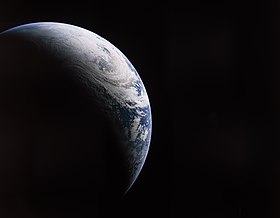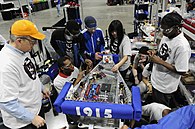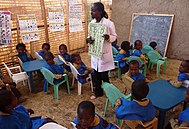Wikipedia:WikiProject Countering systemic bias
| This WikiProject is believed to be semi-active. Although activity is slower than it once was, anyone is welcome to participate in the project. Remove the
|Semi-active parameter from this template if activity resumes or if this tag was changed in error. If almost no activity occurs in this WikiProject, consider replacing this tag with {{WikiProject status|Inactive}}. |
 | |
| Shortcut | WP:CSB |
|---|---|
| Category | WikiProject Countering systemic bias |
| Project banner template | {{WikiProject Countering systemic bias}} |
| Userbox | {{User CSB}} |
The Wikipedia project contains several types of WP:NPOV violations that arise from systemic bias in the demographics of the editor community.[1] Encyclopedic coverage is imbalanced and often omits points of view from under-represented demographic groups. Systemic bias on Wikipedia may take the form of gender, geographical, racial, ideological, and other forms of bias.
See § Further reading for studies, statistics, and more information that demonstrate contributor or subject imbalances.
Goals
[edit]- Reduce systemic bias on Wikipedia as much as possible, consciously focusing upon subjects and points of view neglected by the encyclopedia as a whole.
- Improve the editing community's understanding of the systemic bias in Wikipedia by reviewing existing scholarship and ensuring that recent studies about Wikipedia's systemic bias are included as sources, both in articles and discussions among editors. Ensure that sections about systemic bias in these articles are clear, complete, and concise.
Scope
[edit]The first goal is extremely broad, as under-represented POVs may affect almost any article. It may be advisable to focus on projects within the scope of the related WikiProjects listed below.
The second goal can be accomplished by WikiProject members sharing the latest research about Wikipedia's systemic bias on this WikiProject's talk page, as well as in articles about Wikipedia itself and in relevant content and policy discussions among editors.
Systemic bias in coverage and selection of articles
[edit]Research consistently finds systemic bias in Wikipedia's selection of articles in its various language editions.[1][2] This bias leads, without necessarily any conscious intention, to the propagation of various prejudices and omission of important information. Wikipedia's increasing influence on the way people comprehend the world makes this bias a potentially serious threat.
Selection based on gender bias
[edit]Wikipedia has a longstanding controversy concerning gender bias and sexism.[3][4][5][6][7][8] Wikipedia has been criticized[3] by some journalists and academics for lacking not only female contributors but also extensive and in-depth encyclopedic attention to many topics regarding gender. An article in The New York Times cites a Wikimedia Foundation study which found that fewer than 13% of contributors to Wikipedia were women. Sue Gardner, then the executive director of the foundation, said increasing diversity was about making the encyclopedia "as good as it could be". Factors the article cited as possibly discouraging women from editing included the "obsessive fact-loving realm", associations with the "hard-driving hacker crowd", and the necessity to be "open to very difficult, high-conflict people, even misogynists".[4]
Selection based on racial bias
[edit]A challenge for editors trying to add Black history articles to Wikipedia is the requirement that potential article topics, such as historical individuals or events, meet Wikipedia's "notability" criteria. Sara Boboltz of HuffPost wrote that the Wikipedia notability criteria "is a troubling problem for those fighting for more content about women and minorities", because "there's simply less [published] documentation on many accomplished women and minorities throughout history – they were often ignored, after all, or forced to make their contributions as someone else's assistant."[9]
Maher stated that one issue is that "content on Wikipedia has to be backed up by secondary sources, sources that she says throughout history have contained a bias toward white men;" "people of color have not been represented in mainstream knowledge creation or inclusion in that knowledge," as "encyclopedias of old were mostly written by European men."[10]
Although these assume bias, the presence of white nationalists and other far-right extremists on Wikipedia is an ongoing problem that is unlikely to go away in the near future given the rightward political shift in countries where the majority of the site’s users live." The SPLC cited the article Race and intelligence as an example of the alt-right influence on Wikipedia, stating that at that time the article presented a "false balance" between fringe racialist views and the "mainstream perspective in psychology."[11]
Selection based on ideological bias
[edit]Task forces
[edit]Some task forces that focus on particular aspects of systemic bias are linked below:
Defunct task forces
[edit]Talk pages for the following task forces have not been edited in over a year:
- Wikipedia:WikiProject Countering systemic bias/Gender gap task force
- Wikipedia:WikiProject Countering systemic bias/Geography
- Wikipedia:WikiProject Countering systemic bias/Global perspective
- Wikipedia:WikiProject Countering systemic bias/History
- Wikipedia:WikiProject Countering systemic bias/Mathematics
- Wikipedia:WikiProject Countering systemic bias/Politics
- Wikipedia:WikiProject Countering systemic bias/Religion task force
Tasks
[edit]There are many things you may do, listed roughly from least to most intensive:
- Sign up as a participant and mention any interests you may have related to CSB. Watch the talk page, and participate in discussions there.
- Read news articles and other sources from political view points you wouldn't normally read or in other languages. If you're multilingual, translate articles from other languages.
- Consciously edit topics that are systemically under-represented, such as geographic places in Africa. Changing one out of every twenty of your edits to something outside your "comfort zone" would be substantial.
- Create articles for underrepresented groups and topics. Women in Red keeps a list of potentially notable women that do not have articles on the English Wikipedia.
- Be careful not to worsen the bias with your deletion nominations. If you are not familiar with a subject area, discuss your concerns on appropriate forums before making an AfD nomination.
- Review articles being discussed for deletion. Advocate to keep suitable articles about under-represented topics. Improve articles that are being considered for deletion. For example, use WikiProject delete sorting to review deletion nominations of biographies about women WP:DS/WOMEN
- Change the demographic of Wikipedia. Encourage friends and acquaintances that you know have interests that are not well-represented on Wikipedia to edit. If you are at high school or university, contact a professor in minority, women's, or critical studies, explain the problem, and ask if they would be willing to encourage students to write for Wikipedia.
Related WikiProjects and regional noticeboards
[edit]There are several WikiProjects and regional notice boards that have potential to help out in our efforts. We may also eventually want to create new WikiProjects as part of this effort.
WikiProjects:
- WikiProject Authors
- WikiProject Biblical Criticism
- WikiProject Buddhism
- WikiProject Biography
- WikiProject Catholicism
- WikiProject Conservatism
- WikiProject Disability
- WikiProject Ethnic Groups
- WikiProject Gender Studies
- WikiProject Hinduism
- WikiProject Feminism
- WikiProject Indigenous peoples of North America
- WikiProject Indigenous peoples of the Americas
- WikiProject Islam
- WikiProject Languages
- WikiProject LGBT studies
- WikiProject Organized Labour
- WikiProject Politics
- WikiProject political figures
- WikiProject Military history
- WikiProject World music
- WikiProject Women in Red
- WikiProject Women's sport
- Wikipedia:WikiProject Women scientists
- Wikipedia:WikiProject Women's health
See also:
- Category:WikiProjects relevant for countering systemic bias
- {{Infobox WikiProject}}, which has a
|csb=yesparameter putting projects in that category - Article Rescue Squadron
- Hinduism-related topics notice board
- Middle Eastern military history task force
- Middle Eastern military history task force
- WikiProject Visual arts/Global visual art taskforce (art from non-Western cultures to balance the strong systemic bias towards the Western canon)
- Wikipedia:WikiProject Football/Women's football task force
Africa
[edit]Latin America or the Caribbean
[edit]
See also:
- Caribbean Wikipedians' notice board
- Argentina-related regional notice board
- WikiProject Echo, which translates pages from other WikiProjects
Asia
[edit]
Also
- Middle East, under Category:WikiProject Middle East
- Notice board for Pakistan-related topics
- Notice board for India-related topics
- Indonesia-related topics notice board|topics notice board
- Thailand-related topics notice board
Europe
[edit]- WikiProject Basque
- WikiProject Belarus
- WikiProject Bulgaria
- WikiProject Croatia
- WikiProject Estonia
- WikiProject Galicia
- WikiProject Latvia
- WikiProject Moldova
- WikiProject Netherlands
- WikiProject Ukraine
Other projects
[edit]- meta:Wikimedia urban postering campaign
- Wikipedia:WikiProject Interlanguage Links/Ideas from the Hebrew Wikipedia - a project in the Hebrew Wikipedia, and in the first stages of being exported to other languages, to add interlanguage links to articles which don't have them. One of its positive side effects is that it facilitates writing articles about the culture specific to that language.
- Wikipedia:WikiProject Countering systemic bias/Mathematics
Related cleanup templates
[edit]The template {{globalize}} may be placed to produce
The examples and perspective in this article may not represent a worldwide view of the subject. |
The template {{toofewopinions}} may be placed to produce
The examples and perspective in this article may not include all significant viewpoints. |
The template {{religion primary}} may be placed to produce
This article uses texts from within a religion or faith system without referring to secondary sources that critically analyze them. |
The template {{recentism}} may be placed to produce
This article appears to be slanted towards recent events. |
When these templates are used they should be accompanied by a brief note on the talk page to outline what exactly you feel needs to be addressed.
Members
[edit]Please add your name to the members page.
We of course encourage all members of WikiProject Countering systemic bias, to also promote their membership to other Wikipedians, by adding the Userbox template to their personal user page. This is fast and easy to do. You only need to add this line at your user page: {{User WikiProject Countering systemic bias}}, and then you will find this wonderful blue userbox displayed:
| This user is a participant in WikiProject Countering systemic bias. |
If you have specific interests relating to countering systemic bias, feel free to briefly describe them there or on this Wikiproject's talk page so we can get a sense of the strengths of the project.
References
[edit]- ^ a b Hube, Christoph (2017-04-03). "Bias in Wikipedia". Proceedings of the 26th International Conference on World Wide Web Companion. WWW '17 Companion. Republic and Canton of Geneva, CHE: International World Wide Web Conferences Steering Committee: 717–721. doi:10.1145/3041021.3053375. ISBN 978-1-4503-4914-7. Cite error: The named reference "Hube2017" was defined multiple times with different content (see the help page).
- ^ Livingstone, Randall M. (2010-11-23). "Let's Leave the Bias to the Mainstream Media: A Wikipedia Community Fighting for Information Neutrality". M/C Journal. 13 (6). doi:10.5204/mcj.315. ISSN 1441-2616.
- ^ a b Cassell, Justine (February 4, 2011). "Editing Wars Behind the Scenes". New York Times.
- ^ a b Noam Cohen, "Define Gender Gap? Look Up Wikipedia's Contributor List," The New York Times. Found at The New York Times, January 31, 2011.
- ^ "Wikipedia's Women Problem". Nybooks.com. 2013-04-29. Retrieved 2013-11-19.
- ^ Wikipedia's Sexism Toward Women Novelists
- ^ Dunn, Gaby (2013-05-01). "Does Sexism Lurk?". Dailydot.com. Retrieved 2013-11-19.
- ^ Zandt, Deanna. "Yes, Wikipedia is Sexist". Forbes.com. Retrieved 2013-11-19.
- ^ Boboltz, Sara (April 15, 2015). "Editors Are Trying To Fix Wikipedia's Gender And Racial Bias Problem". HuffPost. Retrieved June 16, 2023.
- ^ Lapowski, Issie (March 5, 2015). "Meet the Editors Fighting Racism and Sexism on Wikipedia". wired.com. Retrieved June 16, 2023.
- ^ Ward, Justin (March 12, 2018). "Wikipedia wars: inside the fight against far-right editors, vandals and sock puppets". Southern Poverty Law Center. Retrieved June 16, 2023.
See also
[edit]- Wikipedia:Systemic bias
- FUTON bias
- Wikipedia:Translation
- Wikipedia:WikiProject Countering systemic bias/Global perspective
- Wikipedia:CSB Collaboration of the Week (inactive)
- Wikipedia:University of Würzburg survey, 2005 (old)
- Wikipedia:WikiProject Gender Studies/Countering Systemic Gender Bias (inactive)
- Wikipedia:Geographic imbalance
- Wikipedia:WikiProject Countering systemic bias/Research publications/harasssment
- Wikipedia:Race and ethnicity
- Self-censorship
Further reading
[edit]- Floating Sheep Collective's report "Geographies of the World's Knowledge" (pdf) is available from Visualizing Data at the Oxford Internet Institute and discusses places and time periods which Wikipedia articles tend to focus on or ignore.
- Wikipedia edits visualized shows the locations of editors worldwide as they edit on the randomly selected day of May 10, 2011.
- "Gender Bias in Wikipedia and Britannica" by Joseph Reagle and Lauren Rhue in the International Journal of Communication
- "WP:Clubhouse? An Exploration of Wikipedia's Gender Imbalance" a conference paper by Lam, Uduwage, Dong, Sen, Musicant, Terveen, and Riedl. (commentary on this from Signpost)
- "Gender Gap: Recapping some basics about what we're doing" a note by Sue Gardner, the Wikimedia Foundation's executive director
- "Define Gender Gap? Look Up Wikipedia’s Contributor List" by Noam Cohen in The New York Times
- Wikipedia's Indian problem: settler colonial erasure of native American knowledge and history on the world's largest encyclopedia by Kyle Keeler, in the journal Settler Colonial Studies
External links
[edit]- Under Reported Stories by Thomson Reuters Foundation
- Under-Told Stories
- The Neglected Books Page - www.NeglectedBooks.com: Where forgotten books are remembered








